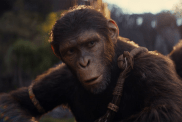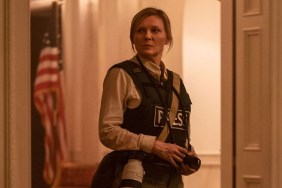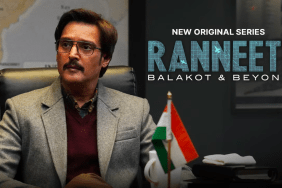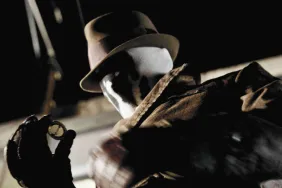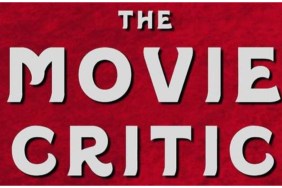
Without hesitation Steven Spielberg lays on the schmaltz and he lays it on thick as War Horse is one scene of calculated manipulation after another. Sometimes it’s the “golly gee” performance of first-timer Jeremy Irvine. Sometimes Spielberg simply takes things too far in his attempt to humanize the horse at the center of the story. And then there’s the story’s transparent narrative as each and every turn in the story is foreshadowed, sometimes two hours in advance. As a result War Horse is so sentimentally sappy it’s almost dripping off the screen and it doesn’t get better with multiple viewings, it just numbs you even more.
Opening just prior to the First World War in the small English town of Devon, we are introduced to the Naracott family of farmers. Ted Naracott (Peter Mullan) is a drunkard and he’s made his way to town to buy a plow horse when a beautiful thoroughbred captures his attention. Despite the fact it’s a horse that would be useless for his needs, and if he were to buy it he wouldn’t have enough money to pay his landlord (David Thewlis), he decides that horse will be his. Oh, and what do you know? He’s bidding against said landlord, but he’ll be a monkey’s uncle before he lets that man get the best of him and away he walks with a horse he doesn’t need and 30 guineas less than he had when he woke up this morning. Rent be damned.
Ashamed, Ted returns home to be greeted by the stern look of his wife (Emily Watson) and the wide-eyed astonishment of his 15-year-old son Albert (Irvine). I’m sorry; I forgot to tell you about the opening scenes in the film where Albert sees this very same horse take its first steps in this world. To think it would ever end up in his possession would be crazy talk, and yet, here he is. But there’s a wrinkle, Albert’s mother isn’t so keen on keeping the equine until Albert promises to train him, “I’ll do it mum. I’ll train ‘im real good, I will. You’ll see.” Of course she caves and Albie begins his relationship with Joey the horse, training him to take the plow collar and come to him when he mimics the hoot of an owl. It’s Screenwriting 101 folks and if you don’t think these story elements will come back later on in the film you’d better guess again.
And then comes the further emotional manipulation of the audience and it’s done in such a way it’s almost galling. In a scene after Ted doesn’t have enough money to pay rent on their land (because he bought the wrong kind of horse), he decides he’s going to shoot the horse if it won’t do what he needs it to do. It’s at this moment he actually grabs a shotgun and points it at the horse. What happens next I won’t say, but we have now reached the point where we are looking at what may be one of the most ignorant human beings I’ve seen in a movie, and that’s saying something considering the entire population of Devon seems to come out just to see if ol’ Joey will plow the family’s rocky field. Yes, it’s quite clear this is a town lacking in both intelligence and things to do.
Soon plowing fields is the least of the town’s concern as Europe goes to war, a turn of events that actually helps save the Naracott’s farm. Albert’s father ends up selling Joey to a British Captain (Tom Hiddleston), who not only promises he’ll return Joey to Albert after the war, but is also quite the accomplished artist who spends time sketching the horse in his spare time. You know, so he can send the pictures back to Albert and show him how magnificent his horse is doing. And with that we have now met the first of a series of gooey gumdrop characters to come into Joey’s life and there are many more to come.
Over the course of the war Joey falls in and out of possession, first landing in the hands of two escaped teenage German soldiers as one brother (played by David Kross) tries to save his younger sibling. Next he finds a caring touch with a young French girl who just so happens to be afflicted with osteogenesis imperfecta, but that only lasts for so long as Germans come knocking on her grandfather’s door and take Joey off to become a member of the German army. Here we find Joey will be tested as he’s one of many horses assigned to pull heavy machinery in a not so subtle attempt at symbolism. All of this culminates in a climactic scene most will be talking about without realizing it’s a scene that could be plopped down in the middle of any movie and be just as effective. It’s one thing to be manipulative, but the blatancy of it is incredibly frustrating.
When it comes to War Horse, I don’t think there is any way you can be down the middle. You are either going to love it and be moved to your core or you are going to eventually get to the point I did and want to yell at the screen, “For the love of God, just give the kid his horse!” Sentimentality is either earned and comes as a result of honest storytelling or it comes by manipulating the story to ensure the greatest impact with the audience, War Horse is the latter in spades.
I won’t discount the fact Steven Spielberg, composer John Williams and cinematographer Janusz Kaminski are master storytellers when it comes to using direction, framing, score and composition to their fullest effect. They know exactly what they are doing, be it the scraping of a horse’s hooves through the muddy turf or the stark and plastic amber horizon seemingly ripped from the timecode of Gone with the Wind, and while this kind of filmmaking turns me off in a big way, I can’t ignore the fact they appear to have made the film they intended to make. Fact is, it’s just not for me.
From the outset it felt like War Horse was working on me as Williams’ grandiose score played over the lush country hills and Joey’s mother lay in the grass, preparing to give birth to the life we would follow for the next two-and-a-half-hours. It’s a romantic notion and Spielberg is putting on the moves early and often, I would just prefer he bought me dinner and a drink before he assumed we were going to take our relationship to the next level.

